Cat And Kitten Microchipping
Microchipping is the most reliable way to make sure your cat will be reunited with you if they ever get lost. Since June 2024, it has been a legal requirement for all cats over 20 weeks old to be microchipped in England. We all know cats love to roam and explore but sometimes they can wander a bit too far. With Medivet cat microchipping is included in all our health care plans. Read on to learn how we can help keep your cat safe.
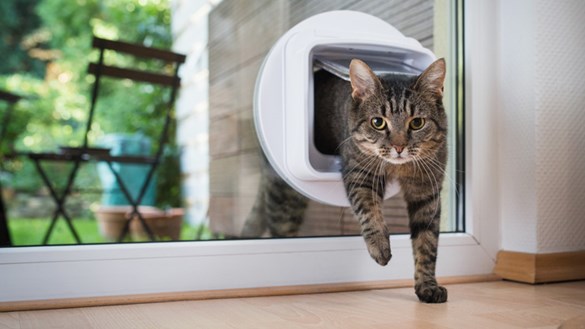
What is a microchip?
Microchips are tiny electronic devices which store data used for identification or processing tasks. Where pet microchipping is concerned they’re about the size of a grain of rice and are inserted under the skin of your cat or kitten, between the shoulder blades. The microchip contains a unique identification number that can be read by a special scanner. This ID is held in a registered database which contains your contact details.
If your cat goes missing and is taken to a vet or an animal shelter, they’ll be able to scan the chip, identify your pet and get in touch with you so you can be reunited.
Why do cats need to be microchipped?
In England, it’s now law to have your cat microchipped by the time they reach 20 weeks old as part of a government drive to reunite more lost and stray cats with their owners. If you don’t do it you’ll have 21 days to get them microchipped or you could face a fine of up to £500.
Aside from it being a legal requirement there are several other reasons why microchipping is a great idea:
- Peace of mind for you – Hopefully your cat will never go missing but we all know cats are curious creatures and may wander further than they should. If that happens and they’re found by someone else, there’s a high chance you’ll get them back if they’re microchipped. It adds an extra layer of security for a cherished family pet
- Ownership disputes – In cases of disputed ownership, such as if your cat is stolen or wanders off and ends up being cared for by another well-meaning family who thinks they’re a stray, the microchip data can reveal who the original owner is
- A reliable form of ID – Collars and tags can break or be removed. Even if your cat is found with no visible identification, a vet or animal shelter will be able to scan them and tell who they belong to
- Emergency medical treatment – If your cat or kitten goes missing and is found injured, a vet can use the microchip information to get in touch with you quickly to authorise urgent medical treatment
- Foreign travel – All countries require your cat to be microchipped before you can travel to them. If you’re planning to go abroad with your cat, having them microchipped makes the process easier
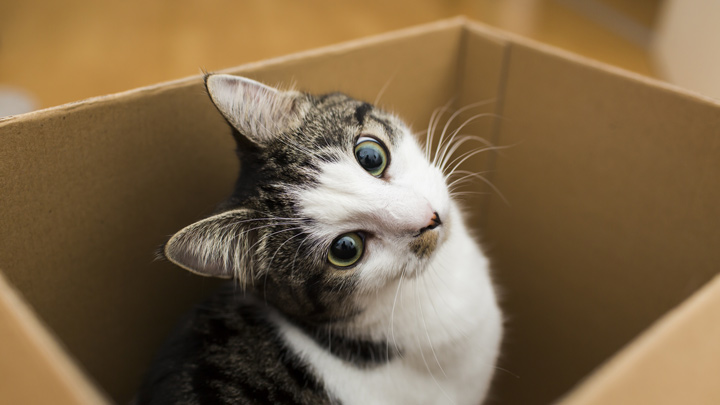
Do I need to microchip and indoor cat?
Yes. The English law applies to all cats whether they’re allowed to roam or they’re a house cat. Even if your cat usually never leaves your home there’s always a risk they might sneak out through an open door or window. When they’re not used to being outside this can be particularly scary for them and they might run away. If the worst happens and they escape, they can quickly be identified and returned to you.
Cost and process of microchipping
Microchipping is a quick, easy and inexpensive procedure carried out by your vet or nurse. It takes just a few minutes and is no more painful than getting a vaccination. The cost of microchipping varies. Your local clinic will give you details but it’s generally an affordable one-time expense to keep your cat safe and secure.
When you take your cat to be microchipped the vet will check them over to make sure they’re healthy. If they’re an older pet, particularly one you’ve adopted from another family, they may scan them to make sure they’re not already chipped.
There’s only momentary discomfort and it’s over in seconds. Once it’s in place your vet will scan the chip to make sure it’s working and add your details to the database. Don’t worry, your cat won’t be able to feel the chip and it will last their entire lifetime.

How do I change my cat’s microchip details?
It’s really important you keep your details up to date if you move house or get a new phone number or email. If you know the database your cat or kitten is registered with get in touch with them online or by phone and they’ll update your details.
If you’re not sure, simply make a quick trip to the vet or animal shelter where they’ll be able to scan your pet and let you know who to contact.
What to do if your cat goes missing
It’s easy to feel overwhelmed if your cat goes missing but there are things you can do to help bring them home safe. First, search your house and garden – cats can hide in the most surprising of places. Call their name and shake their favourite food or treat.
Walk around the area and alert your neighbours. Ask them to check their sheds and garages too as cats can sometimes wander into someone’s house and get trapped. Make posters and put them up locally, post on social media to widen the search - the more eyes looking for them the better.
Let your vet or microchip database provider know they’re missing. This way if anyone finds your cat and they take to a clinic or shelter they can scan the microchip and quickly get in touch with you. Finally, don’t lose hope. Cats are curious creatures – they love to wander off and explore but manage to find their way back after a day or two. In the meantime, stay positive, keep searching and spread the word.

Is there a GPS tracking chip for cats?
Microchipping doesn’t currently provide location information on your cat’s whereabouts. If they’re lost and taken to a rescue centre, a chip will merely reveal details of their ownership. While technology has advanced rapidly over the last two decades it hasn’t reached the point where a GPS tracker can be inserted under the skin. There are many reasons for this, for example, the size of the tracker would be too large for the cat to comfortably live with, and the battery required to power it would need replacing.
Whilst it’s not yet possible, technology is constantly evolving and GPS chips might well be available in the future.
Microchipped cat flaps and bowls
Many cat owners will have stories of unwanted intruders sneaking in through cat flap whether it’s an aggressive cat, fox or other wildlife. But while it may be amusing it can also be frightening and distressing, particularly when you have to get them out.
A microchip cat flap is programmed with your cat’s unique ID number so it will only activate when they’re going in or out. You can programme them so they only open at certain times or according to their routine which can be ideal for multi cat households.
Similarly, microchip pet feeders will only be activated by your cat’s chip, making it easy to control the amount of food they have and when. It’s also great for keeping fresh food covered, if you have a multi-cat house with one on a medicinal diet and feeding them when you’re out during the day.

When can cats be microchipped?
There’s no minimum age to get your cat or kitten microchipped but it’s a good idea to get it done before they go out for the first time. And remember, you’re required by law in England to get them chipped before they’re 20 weeks old.
Often owners will have it done at the same time as they’re neutered when they’re already under general anaesthetic.
Where can cats be microchipped?
Most vets will microchip cats while shelters will make sure to chip any strays before they’re rehomed. With the Medivet Healthcare Plan for Cats microchipping is included, making it easy and affordable to keep your cat safe and healthy.
Is microchipping safe for my cat?
It’s a very safe, quick and almost painless procedure. Your cat may experience a few seconds of discomfort, like they would when getting an ordinary injection, and then it’s over. Complications are very rare and your cat won’t feel the chip once it’s in.
Is it my responsibility to microchip my cat?
Yes, it’s down to you as their legal owner to ensure your cat is chipped. If you don’t, you could be fined up to £500.

Our Healthcare Plan For Your Cat
With the Medivet Healthcare Plan, you can save an average of £165 each year and that’s without discounts that the plan offers on top.
Learn more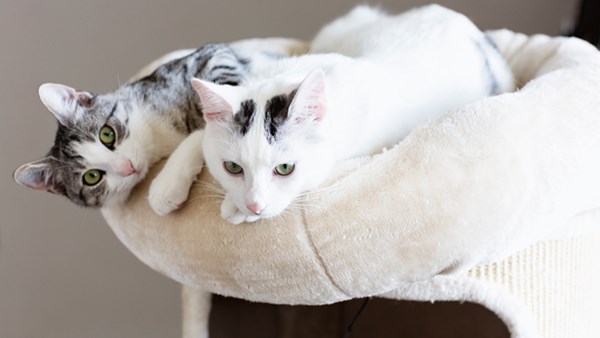
Book a Microchipping Appointment
If you'd like to book a microchipping appointment for your kitten or cat, contact your local practice. If you're not sure where your local Medivet practice is, visit the page below.
Find a vet near youRelated Articles
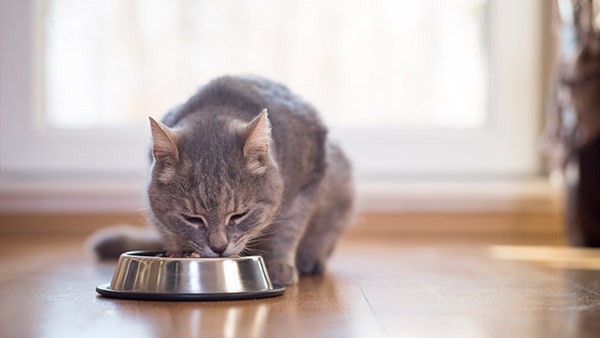
Cat Nutrition
Feeding your cat the right diet can help keep them healthy for years to come. Understanding how much to feed your cat plays a key role in maintaining a healthy weight.
Read article
Understanding Your Cat's Behaviour
Cats are intriguing pets, we’ve tried to answer some common questions from cat-owners about their cat’s behaviour.
Read article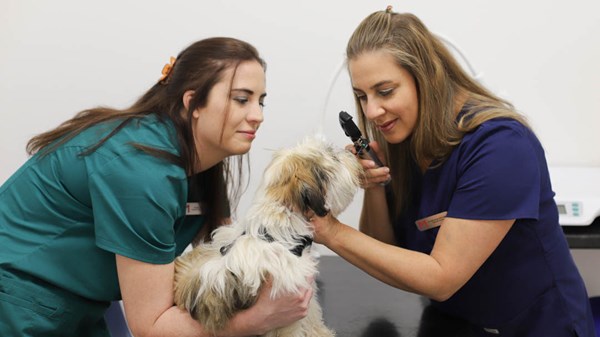
The Importance Of Preventative Care
Vaccines, boosters and medical checks are important for maintaining your pet's health.
Read articleTerms & Conditions
*25% off cat microchipping offer is subject to availability. Offer ends 31 August 2024. One microchip per cat. Offer only valid for cat microchipping; any treatment or examinations required will be charged at the standard rate. Medivet reserves the right to withdraw this offer at any time without prior notice.


